Tabla master Zakir Hussain has had an incredible career in Indian music and as a pioneer of world music. For those of us in the West, his notable and wildly diverse credits include collaborating with George Harrison, Mickey Hart, Yo-Yo Ma, Van Morrison, Bill Laswell, Kenny Loggins, David Grisman, the Kronos Quartet, Charles Lloyd, and John McLaughlin, with whom he was a founding member of the world fusion band Shakti.
This interview was for a preview article for noozhawk.com for Hussain’s performance with sitar player Niladri Kumar at Campbell Hall at the University of California, Santa Barbara as part of the Arts and Lectures Series on 11/2/16. It was done by email, with answers received on 10/20/16. (Susana Millman photo)
Jeff Moehlis: What can people look forward to at your upcoming concert in Santa Barbara? And can you tell us a bit about Niladri Kumar, who you’ll be performing with?
Zakir Hussain: This show in the first half will be a traditional Indian classical music performance with Niladri Kumar assuming the lead role on the sitar, and I will take the role of the accompanist tabla player. Niladri is one of the finest young instrumentalists of India, and many musicians consider him to be the next great sitarist representing Indian music. There are many young musicians who have worked their way up the ranks to achieve recognition and fan following in India. These young performers have learned their craft from their guru but have at the same time assimilated many genres of music from around the globe. What will be interesting is to see young Niladri present traditional ragas, as well as in the second half present a more contemporary approach to folk music of India.
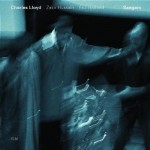
JM: You’ve played with a number of great musicians over the years, including one of our local musical heroes, Charles Lloyd. What has it been like working with him?
ZH: Working with master Lloyd has been a learning experience of the first order. He is one of the greatest visionary artists on this Earth. He believes in presenting his music exactly as he feels it at that moment of performance. It is never decided what the first song will be. This freedom of going where his mood takes us is the way music is made in India, and for me it is like sitting with my guru and following the spontaneous flow of ideas.
JM: You’ve also performed and recorded with one of my favorite guitarists, John McLaughlin. How did you first meet him, and was it immediately clear that there was a powerful musical chemistry between you?
ZH: John and I briefly met in New York, but the in-depth meeting took place in San Francisco where I saw Mahavishnu Orchestra perform. After the show we went to see the great Indian sarod maestro Ustad Ali Akbar Khan. He asked John to play and John asked me to join him, and it was like two brothers long lost just found each other. The music flowed as one spontaneous thought, and it was clear that we had to continue playing. John made that happen by forming the group SHAKTI with me, L Shankar and Vikku Vinayakaram.
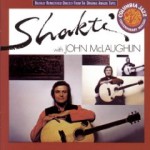
JM: I’m a particular fan of the song “Joy” from the first Shakti album. What are your reflections on that performance?
ZH: “Joy” was a calling forth of rapturous happiness. This piece emerged on the first day we got together from us just jamming on a riff. The groove, the tempo and the soaring rhythmic melody that took shape was so happy that we decided that it should be called how we felt while playing – “JOY”.
JM: Can you tell us a bit about the experience of working on the soundtrack for Apocalypse Now?
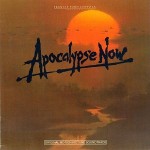
ZH: Carmine Coppola was in charge of music production for the movie. He sent out VHS tapes to many musicians in the Bay Area, and all were provided time in the studio to score the movie. Mickey Hart also received the VHS and he called me and many other musicians in to help create the score. The great thing was that we were left on our own to create what we felt the score should be like, and in the end Carmine chose bits from all the scores that were turned in and assembled his vision of what the final score should be, and it was magnificent.
JM: This is a very broad question, but here goes – what, to you, are the most important differences between the Indian and Western musical traditions?
ZH: I think that one of the main hurdles in making music with musicians that are from other traditions is the thought that they have fundamental differences. I don’t believe in that. I believe that music is music no matter where in the world it is played. If one approaches the interaction with an open mind ready to do whatever it takes to make it work rather then worry about supposed boundaries, then great music can be made.
JM: Many people in the West learned about the music of India because of The Beatles. Was it a big deal to you when The Beatles visited India, or were they in a totally different musical world from you at the time?
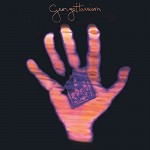
ZH: We had George Harrison visit my home. I was not aware of who he was and of the group as well, but I knew that he was an important musician and he was a very loving human being. He sat on the floor with us, shared our food, and on his portable record player played their new album for us. It was a very happy and memorable time for me.
JM: What advice would you give to an aspiring musician?
ZH: Do not think of music as work. It should be a joyous union between yourself and your music. If you can establish that kind of a connection then you are on your way.
JM: What are your musical plans for the near future?
ZH: I just finished a commissioned piece for tabla and symphony orchestra. It is called “PESHKAR”. The American premier is next April at the Kennedy Center with the National Symphony Orchestra under the baton of Cristoph Eschenbach.
This year is the 25th anniversary of Planet Drum and Universal is re-releasing it in December with 3 new songs added.
I am also working as co-producer on Mickey Hart’s new album as well as getting ready for the winter tour of India to take part in the music season there. I will play about 70 shows between December and February all over India.

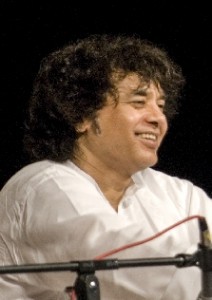
Discussion
No comments for “Interview: Zakir Hussain”